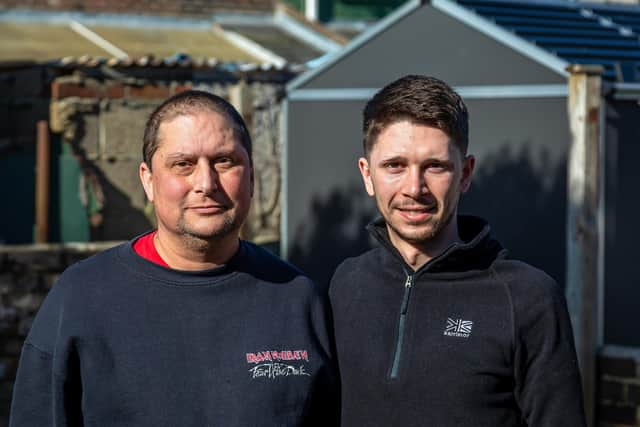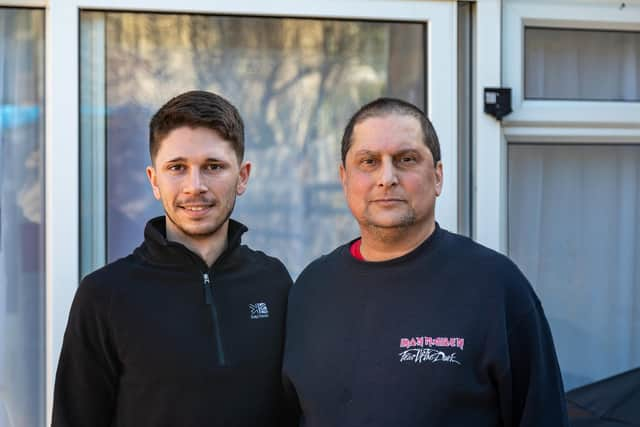Portsmouth dad-of-two with life-limiting prostate cancer urges other men to get checked saying 'it could save your life'
and live on Freeview channel 276
In 2017, Paul Madeira, from North End, was based out in Gibraltar as a navy medic when he first noticed he had a decreased urine stream.
As a ‘relatively fit and healthy man,’ who was 47 at the time, Paul thought it could have been caused by prostatitis - an often harmless inflammation of the prostate gland.
Advertisement
Hide AdAdvertisement
Hide AdPaul believed it would ‘go away on its own’ and ended up waiting a few months to see a doctor.


However, one biopsy later and a referral back home to Queen Alexandra Hospital in Cosham, and Paul was told he had ‘life-limiting’ prostate cancer.
Speaking to The News he said: ‘I was a fit and active young man so I didn’t think it would be anything serious.
‘I didn’t think it could be cancer, let alone terminal cancer.


Advertisement
Hide AdAdvertisement
Hide Ad‘It did cross my mind after I had come back to Portsmouth and I remember being sat outside the doctor’s office thinking “if it’s cancer, it’s cancer - there’s nothing you can do about it.”
‘Despite that when they told me, it was a bit of a shocker.’
In 2018 he was diagnosed with stage four prostate cancer and that summer underwent 20 weeks of chemotherapy at QA.
Paul, now 51, said: ‘That held the cancer at bay for a while.


Advertisement
Hide AdAdvertisement
Hide Ad‘Then in 2019 I had radical targeted radiotherapy, which uses a high dose to shrink the tumour.
‘I had to do that five days a week for four weeks and it seemed to work.
‘I was told I was in remission, which lasted 10 months.’
But a test showed a high level of prostate-specific antigen in his blood indicating the cancer ‘was back.’
Paul underwent a further 30 weeks of chemotherapy and was medically discharged from the navy.
Advertisement
Hide AdAdvertisement
Hide AdAt that point QA doctors told him there was nothing more they could do.
‘There’s the obvious question I asked in the beginning,’ he said.
‘But I was given three different answers, telling me I had between two and 10 years to live, so I didn’t want to know this time.
‘My brain was telling me I didn’t want to know. I’d rather live my life as normally as I can.’
Advertisement
Hide AdAdvertisement
Hide AdSince then the cancer has spread to Paul’s bones and lymph nodes, making physical activities such as walking more difficult.
Although he has been signed up for some future medical trials that could extend his life, Paul is focused on doing things he enjoys and spending time with his children Jordan, 24, and Kayleigh, 22, where possible.
He said: ‘I’ve had almost 50 years of being physically fit and able to do the things I enjoy so it’s hard to have that taken away.
‘I love walking and used to walk two to three miles every day. Now I manage a short walk and it wipes me out the next day.’
Advertisement
Hide AdAdvertisement
Hide AdIn line with a new campaign from Prostate Cancer UK, Paul is advocating for the use of a new online checker that can tell men if they are at risk of developing prostate cancer.
The ‘risk checker’ takes 30 seconds to complete and warns users if they should consult a doctor, as well as offering to provide more information.
It comes as the latest statistics released by NHS England showed urological referrals in Portsmouth dropped by 1,090 (24 per cent) since the start of the pandemic
And nationally it is thought there are 14,000 men who need treatment for prostate cancer but have not yet come forward.
Advertisement
Hide AdAdvertisement
Hide AdPaul said: ‘I would urge all men to use the online checker. Even if they think they are too young or healthy to get prostate cancer it could happen to them.
‘And if you have any symptoms or concerns at all please do go see your GP, even if you think it’s a hassle - it could save your life.
‘I waited a few months after my symptoms to see a doctor. I’m not saying I would definitely have been saved by going straight away - but you don’t know.’
According to Prostate Cancer UK, one in eight men will get prostate cancer in their lifetime.
Advertisement
Hide AdAdvertisement
Hide AdNHS research found that half of people would delay coming forward to their GP during the height of the pandemic because they didn’t want to burden the health service.
More than 58,000 men in England began treatment for prostate cancer since April 2020, but that’s 14,000 fewer than would have been expected compared with pre-pandemic numbers.
Men over 50, black men, or those whose father or brother had the disease are at even greater risk.
Although men shouldn’t wait for symptoms, anyone who does experience symptoms such as problems urinating or needing to urinate more often, should speak to their doctor to get checked.
Advertisement
Hide AdAdvertisement
Hide AdFor Nicola Tallett, acting chief executive at Prostate Cancer UK, this was a concern.
She said: ‘Prostate cancer is the most common cancer in men, but the pandemic has meant thousands of men have not come forward for diagnosis and could be missing out on life-saving treatment.
‘Although thousands of men are still being treated each month, if things don’t change soon, the number of men missing out will continue to grow.
‘Men have been telling us they haven’t wanted to “bother” their GP during the pandemic – particularly if they don’t have any symptoms, which is the case for most men with early prostate cancer. This means men at higher risk of the disease are not having those vital conversations about their risk that can lead to a diagnosis.’
Advertisement
Hide AdAdvertisement
Hide AdNational clinical director for cancer for the NHS in England, Professor Peter Johnson, added: ’I urge you to use the Prostate Cancer UK risk checker today – it is a quick and easy way to understand your risk of prostate cancer and how you can take further action if you are at risk.
‘The prognosis for the people we’re yet to see will be much better the earlier we see them but we do need to see them as soon as possible.
‘It’s important men understand prostate cancer often doesn’t show any symptoms at an early stage, so don’t delay – check your risk now. The simple check could be lifesaving.’
Check your risk using Prostate Cancer UK’s online risk checker at prostatecanceruk.org/riskcheck.
A message from the Editor, Mark Waldron
Subscribe here for unlimited access to all our coverage, including Pompey, for just 26p a day.
Comment Guidelines
National World encourages reader discussion on our stories. User feedback, insights and back-and-forth exchanges add a rich layer of context to reporting. Please review our Community Guidelines before commenting.
